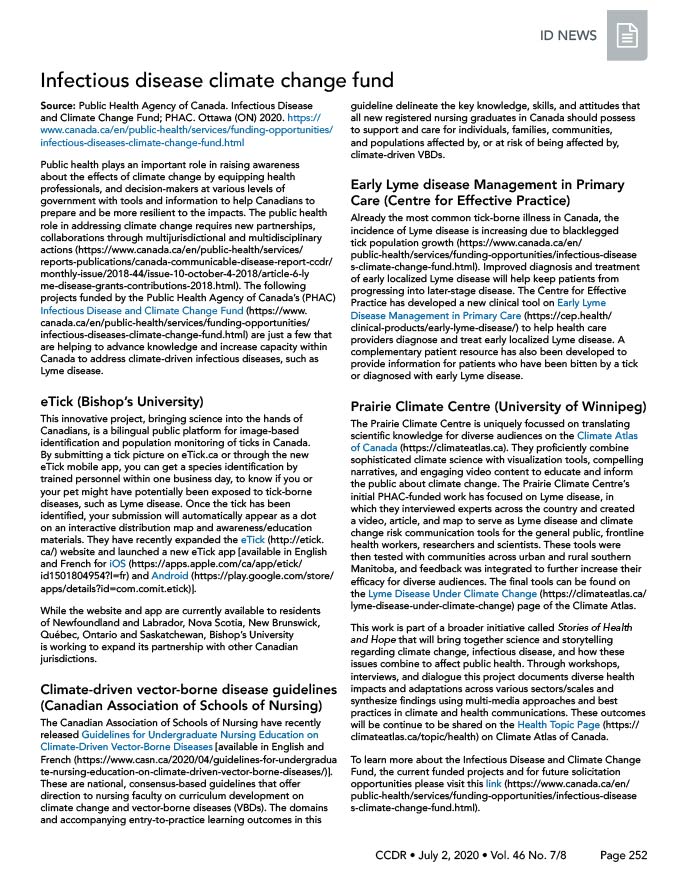Misinformation on COVID-19; Infectious disease climate change fund

 Download this article as a PDF
Download this article as a PDFPublished by: The Public Health Agency of Canada
Issue: Volume 46–7/8: Mandatory childhood immunization programs
Date published: July 2, 2020
ISSN: 1481-8531
Submit a manuscript
About CCDR
Browse
Volume 46–7/8, July 2, 2020: Mandatory childhood immunization programs
ID News
Infectious disease climate change fund
Source: Public Health Agency of Canada. Infectious Disease and Climate Change Fund; PHAC. Ottawa (ON) 2020.
Public health plays an important role in raising awareness about the effects of climate change by equipping health professionals, and decision-makers at various levels of government with tools and information to help Canadians to prepare and be more resilient to the impacts. The public health role in addressing climate change requires new partnerships, collaborations through multijurisdictional and multidisciplinary actions. The following projects funded by the Public Health Agency of Canada’s (PHAC) Infectious Disease and Climate Change Fund are just a few that are helping to advance knowledge and increase capacity within Canada to address climate-driven infectious diseases, such as Lyme disease.
eTick (Bishop’s University)
This innovative project, bringing science into the hands of Canadians, is a bilingual public platform for image-based identification and population monitoring of ticks in Canada. By submitting a tick picture on eTick.ca or through the new eTick mobile app, you can get a species identification by trained personnel within one business day, to know if you or your pet might have potentially been exposed to tick-borne diseases, such as Lyme disease. Once the tick has been identified, your submission will automatically appear as a dot on an interactive distribution map and awareness/education materials. They have recently expanded the eTick website and launched a new eTick app (available in English and French for iOS and Android). While the website and app are currently available to residents of Newfoundland and Labrador, Nova Scotia, New Brunswick, Québec, Ontario and Saskatchewan, Bishop’s University is working to expand its partnership with other Canadian jurisdictions.
Climate-driven vector-borne disease guidelines (Canadian Association of Schools of Nursing)
The Canadian Association of Schools of Nursing have recently released Guidelines for Undergraduate Nursing Education on Climate-Driven Vector-Borne Diseases (available in English and French). These are national, consensus-based guidelines that offer direction to nursing faculty on curriculum development on climate change and vector-borne diseases (VBDs). The domains and accompanying entry-to-practice learning outcomes in this guideline delineate the key knowledge, skills, and attitudes that all new registered nursing graduates in Canada should possess to support and care for individuals, families, communities, and populations affected by, or at risk of being affected by, climate-driven VBDs.
Early Lyme disease Management in Primary Care (Centre for Effective Practice)
Already the most common tick-borne illness in Canada, the incidence of Lyme disease is increasing due to blacklegged tick population growth. Improved diagnosis and treatment of early localized Lyme disease will help keep patients from progressing into later-stage disease. The Centre for Effective Practice has developed a new clinical tool on Early Lyme Disease Management in Primary Care to help health care providers diagnose and treat early localized Lyme disease. A complementary patient resource has also been developed to provide information for patients who have been bitten by a tick or diagnosed with early Lyme disease.
Prairie Climate Centre (University of Winnipeg)
The Prairie Climate Centre is uniquely focussed on translating scientific knowledge for diverse audiences on the Climate Atlas of Canada. They proficiently combine sophisticated climate science with visualization tools, compelling narratives, and engaging video content to educate and inform the public about climate change. The Prairie Climate Centre’s initial PHAC-funded work has focused on Lyme disease, in which they interviewed experts across the country and created a video, article, and map to serve as Lyme disease and climate change risk communication tools for the general public, frontline health workers, researchers and scientists. These tools were then tested with communities across urban and rural southern Manitoba, and feedback was integrated to further increase their efficacy for diverse audiences. The final tools can be found on the Lyme Disease Under Climate Change page of the Climate Atlas.
This work is part of a broader initiative called Stories of Health and Hope that will bring together science and storytelling regarding climate change, infectious disease, and how these issues combine to affect public health. Through workshops, interviews, and dialogue this project documents diverse health impacts and adaptations across various sectors/scales and synthesize findings using multi-media approaches and best practices in climate and health communications. These outcomes will continue to be shared on the Health Topic Page on Climate Atlas of Canada.
To learn more about the Infectious Disease and Climate Change Fund, the current funded projects and for future solicitation opportunities please visit this link.
Beware the public opinion survey’s contribution to misinformation and disinformation in the COVID-19 Pandemic
Source: MacDonald NE, Dubé E, Greyson D, Graham JE. Beware the public opinion survey’s contribution to misinformation and disinformation in the COVID-19 Pandemic.
The COVID-19 pandemic has been accompanied by an “infodemic” of misinformation and disinformation. Given the large degree of uncertainty, the complexity of the science, and rapidly evolving knowledge, well-intentioned misinformation is not surprising. As scientists race to understand a new disease, partial information and guesswork fill the gap until reliable research evidence is established. Unfortunately, disinformation, defined as deliberately false or misleading information, can be expected when crises are used as opportunities to make money or to undermine existing institutions, including education and health care systems. Regardless of intention, misleading information can spread rapidly in the era of social media and 24/7 news coverage, aided by the influence of fear, anxiety, and stress on learning, beliefs, and health decisions. It is therefore incumbent on those conducting COVID-19 rapid research, especially research associated with public awareness and knowledge translation, to avoid contributing to the spread of misinformation and disinformation through their work.
